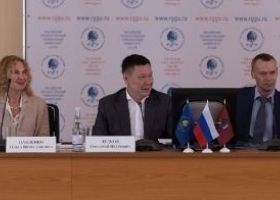 04.06.2021
04.06.2021
On May 24, the administration of RSUH met with Mr. Ledkov, President of the Association of Indigenous Peoples of the North, Siberia and the Far East of the Russian Federation, Senator of the Russian Federation from the Yamalo-Nenets Autonomous Region on the preparation and implementation of the state assignment on the topic "Interactive atlas of the indigenous peoples of the North, Siberia and the Far East: languages and cultures".
The event was attended by Mr. Andreytsev, Chairman of the Union of Indigenous Minorities of Primorsky Krai, Mr. Badalov, Director of the Federal Autonomous Research Institute "Voskhod", Ms. Veisalova, Vice-President of the Association of Indigenous Minorities of the North, Siberia and the Far East of the Russian Federation for education, native languages of the indigenous peoples of the North, Siberia and the Far East of the Russian Federation and project activities in the field of education, Mr. Gyulsky, Vice-President of the Association of Indigenous Peoples of the North, Siberia and the Far East of the Russian Federation for the Siberian Federal District, Mr. Novyukhov, First Vice-President of the Association of Indigenous Peoples of the North, Siberia and the Far East of the Russian Federation, Mr. Klimov, Vice-President of the Association of Indigenous Peoples of the North, Siberia and the Far East of the Russian Federation for Regional Cooperation, Mr. Dyukarev, Chairman of the local public organization of the Taimyr Dolgan-Nenets region "Association of Indigenous Minorities of the Taimyr Krasnoyarsk Territory", employees of the Association, and the Rector's office of RSUH.
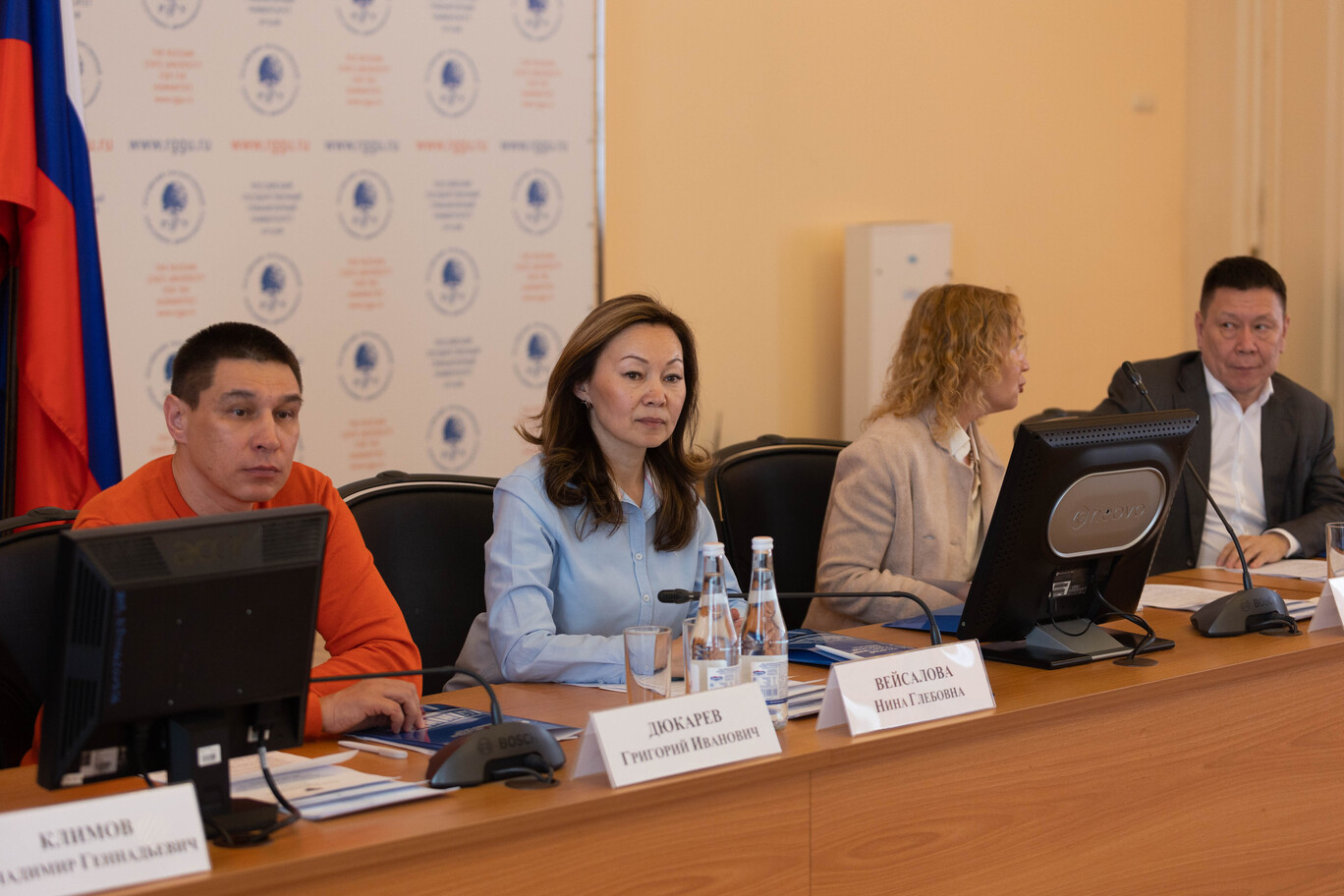
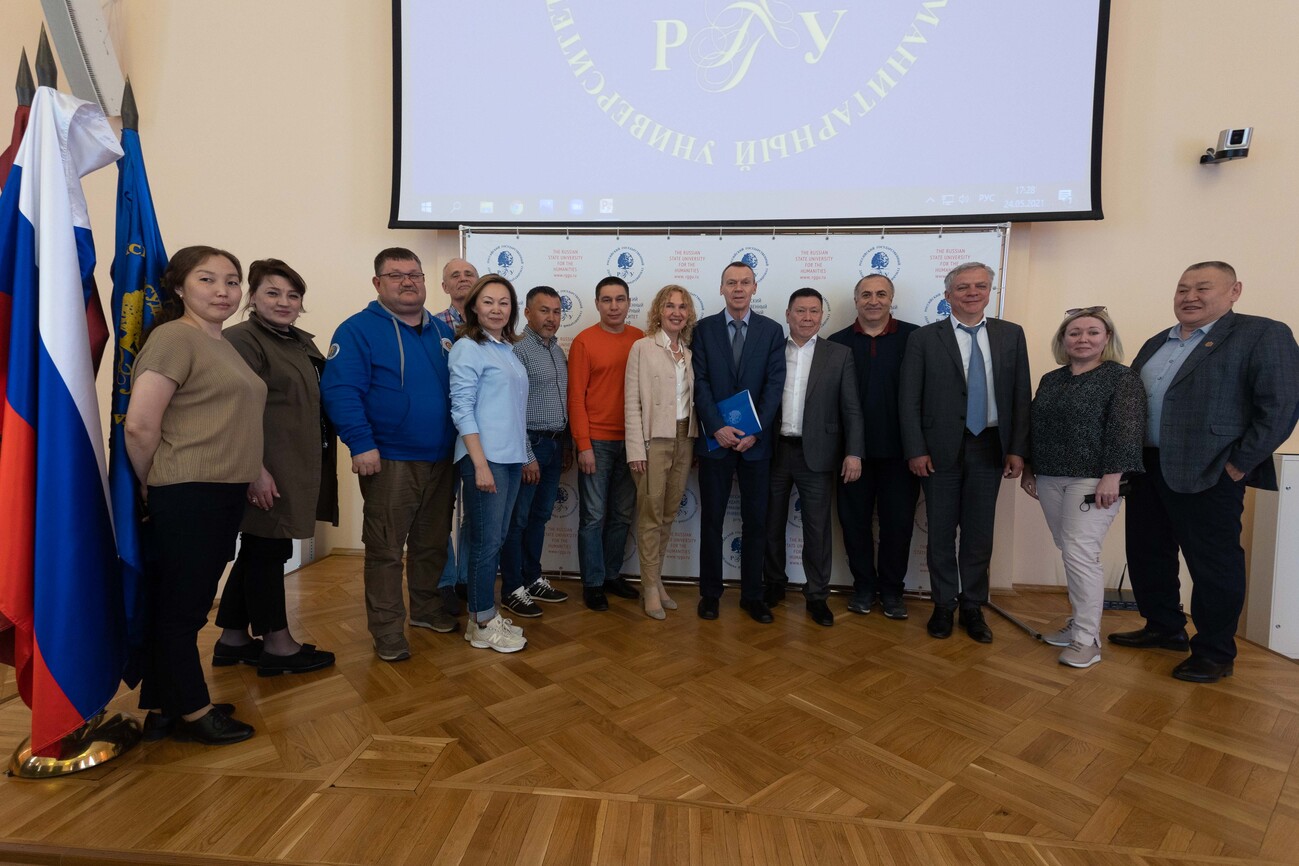
Before the start of the official part, a meeting of the delegation of the Association of Indigenous Minorities of the North, Siberia and the Far East, headed by President Ledkov, was held with Rector Bezborodov and First Vice-Rector Pavlenko. At the meeting, the main directions for the implementation of the project with the participation of the members of the Association were determined.
In the hall of the Academic Council, Rector Bezborodov greeted the participants of the meeting, noting the importance of the joint work of RSUH and the Association on the state assignment.
“We are interested in RSUH working with you, thus fulfilling its social mission. It is important that the topic of the project is rooted in the educational process of RSUH, we have numerous teaching aids that reflect the interest of the faculty in this topic,” said Alexander Borisovich.
Vice-Rector Pavlenko informed the meeting participants about the preparation and implementation of the state assignment on the topic "Interactive Atlas of the Indigenous Peoples of the North, Siberia and the Far East: Languages and Cultures."
“RSUH, under the leadership of Rector Bezborodov, fully joins in this important task, set at the level of the President of the Russian Federation. It is a great honor and responsibility that the Ministry of Science and Higher Education of the Russian Federation should join in and instruct RSUH to implement this project. Discussion of the project was conducted at all levels so that an effective project management formula was developed to understand the process of its implementation,” said Olga Vyacheslavovna.
First Vice-Rector presented the project management structure and functions of the advisory council, interdepartmental working group and the project office.
The advisory board includes the following co-chairs: Dr. Tishkov, Mr. Ledkov, and council members: Dr. Bezborodov, Dr. Golovnev, Dr. Golovko, Dr. Grishkin, Dr. Dambegov, Dr. Kibrik, Dr. Omarov and Dr. Pavlenko, secretary of the board: Dr. Chankhieva. The interdepartmental working group is headed by Rector Bezborodov, the project office is headed by Dr. Pavlenko.
The interactive atlas is a multi-level database on the life and culture of indigenous peoples. It includes three layers: ethnopolitical, ethnological-anthropological and linguistic.
The purpose of the atlas is to analyze, systematize and present a large amount of data on the historical, cultural, socio-anthropological and linguistic diversity of indigenous peoples.
The result of the project will be the creation of a high-quality new software and intellectual product (Interactive Atlas) as a scaled interactive fault-tolerant platform with elements of built-in intelligence, based exclusively with domestic software and with the highest level of information security.
“The result is extremely important for us, because there is a need for a special unifying interactive platform that will respond to all major trends. The Atlas should show the civilizational experience of each of the indigenous minorities. The access to this platform will provide an opportunity for systematic decision-making by the state,” said Dr. Pavlenko.
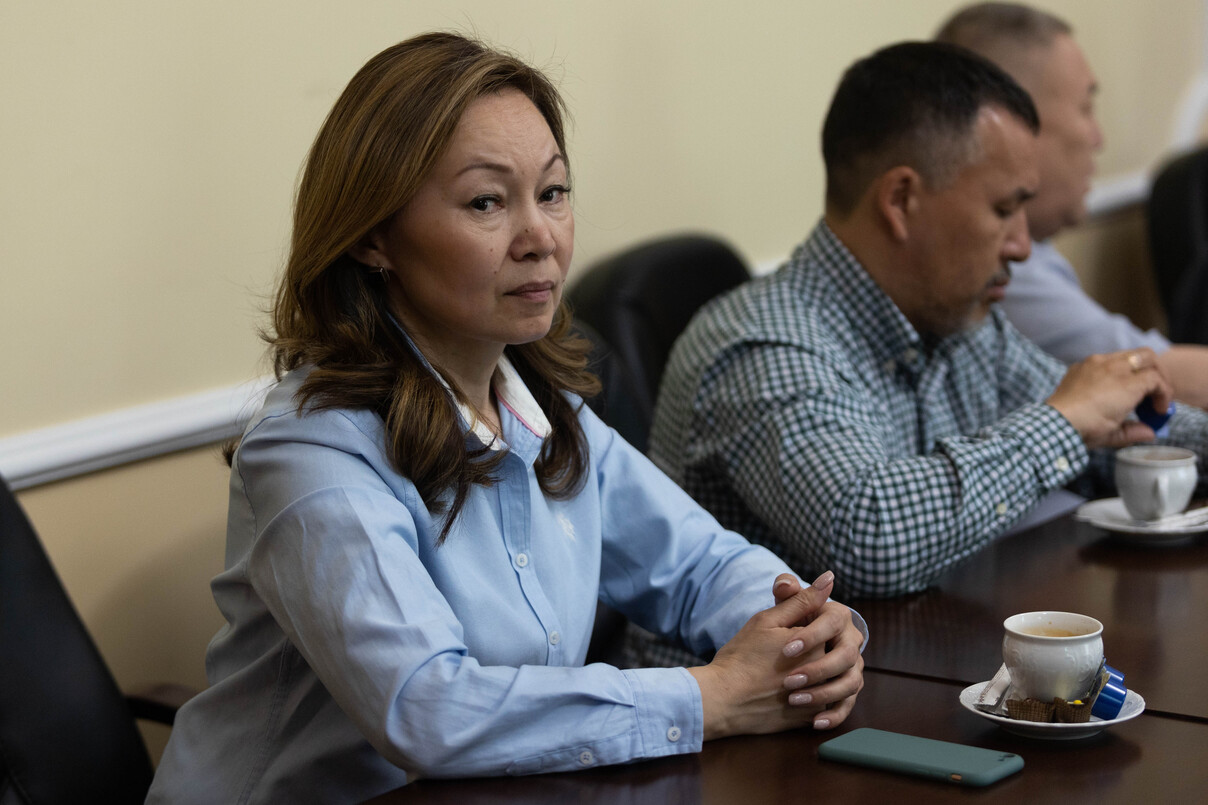
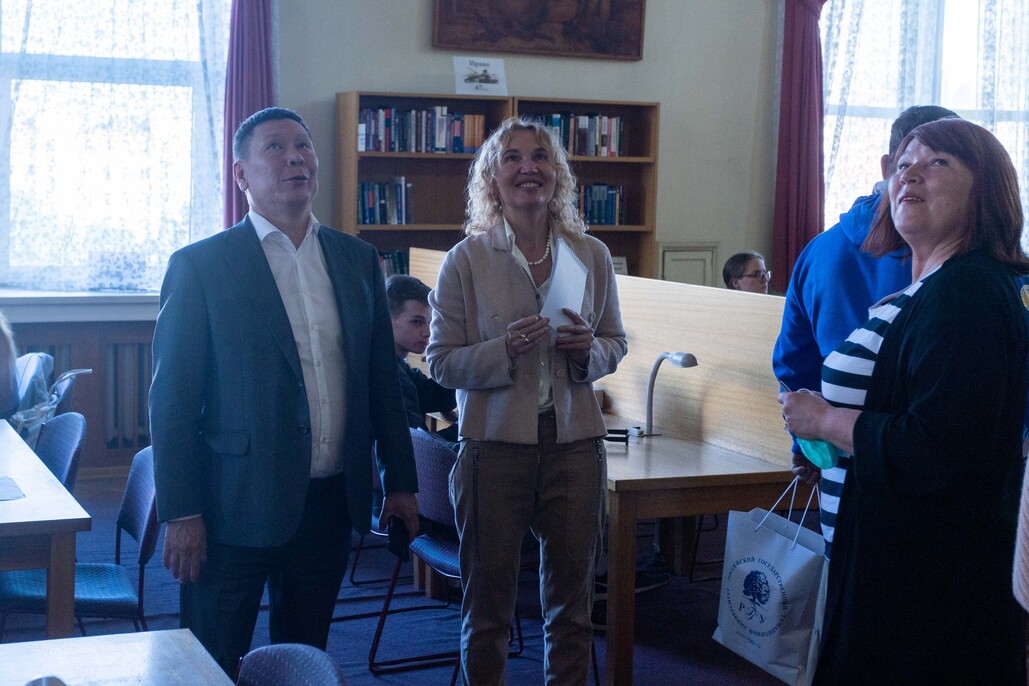
She also presented the thematic sections of the Atlas, the roadmap for the implementation of the project and the composition of the members of the interdepartmental group, which includes the Association of Indigenous Minorities of the North,
Siberia and the Russian Far East (headed by Mr. Ledkov), RSUH (headed by Rector Bezborodov), (Center for Social Anthropology, Center for Socio-Political Research and Information Technologies, Institute of Linguistics, Center for Typology and Semiotics of Folklore, Center for Integrative and Digital Humanities), Herzen Russian State Pedagogical University (headed by Rector Bogdanov), the Kunstkamera Museum (headed by Dr. Golovnev), Institute of Ethnology and Anthropology RAS (scientific supervisor Dr. Tishkov, director Dr. Funk), Institute of Linguistics, RAS (headed by Dr. Kibrik), Institute of Linguistic Research RAS (Dr. Golovko), Research Institute "Voskhod" (headed by Dr. Badalov) and Tomsk State University (headed by Rector Galazhinsky).
Mr. Ledkov, President of the Association of Indigenous Minorities of the North, Siberia and the Far East, expressed gratitude to the administration of RSUH.
“I am glad that we were able to get together and discuss the implementation of the project. We will provide RSUH with a working group headed by Dr. Veisalova and Mr. Dyukarev. Together we can fill the project with the necessary information in a quality manner,” noted Grigory Petrovich.
Dr. Ledkov added that he supported a list of ten indigenous minorities studied at the first stage of the project.
Mr. Badalov, Director of the Autonomous Institution Research Institute "Voskhod", spoke on the importance of the interactive atlas not only for the academic community, but also for everyone interested in this topic.
“This project will be a good practical example of the benefits that digital technologies can bring not only to scientists, but also to all users. ... We will dynamically move in stages to show results that will be of interest to everyone,” stressed Andrey Yuryevich.
Mr. Omarov, Director of the Center for Socio-Political Research and Information Technologies of RSUH, informed the participants of the meeting about the work carried out at the university for the study of the Northern region.
“As for the Arctic, the Center has a group called “Arctic”, which is studying the role of a public organization in protecting the rights of the indigenous peoples of the North,” said Magomed Alievich.
Mr. Dyukarev, Chairman of the local public organization of the Taimyr Dolgano-Nenets region "Association of Indigenous Minorities of the Taimyr Krasnoyarsk Territory", suggested involving the museum community in the project.
“A pool of aademic institutions has been formed, but this is a fundamental science, yet the information about everyday things is available in our local history museums, so it would be right to involve the museum community at some stage of the project,” added Grigory Ivanovich.
Mr. Andreitsev, Chairman of the Union of Indigenous Minorities of the Primorsky Territory, made a proposal to involve the Far Eastern Branch of the Arsenyev Russian Academy of Sciences (FEB RAS).
“They (FEB RAS - Ed.) have a large archive dating from the 1960s, the materials of which can be used in the project. In addition, I would like to attract the Arsenyev branch, in which the exposition of indigenous peoples was recently updated,” explained Valentin Vladimirovich.
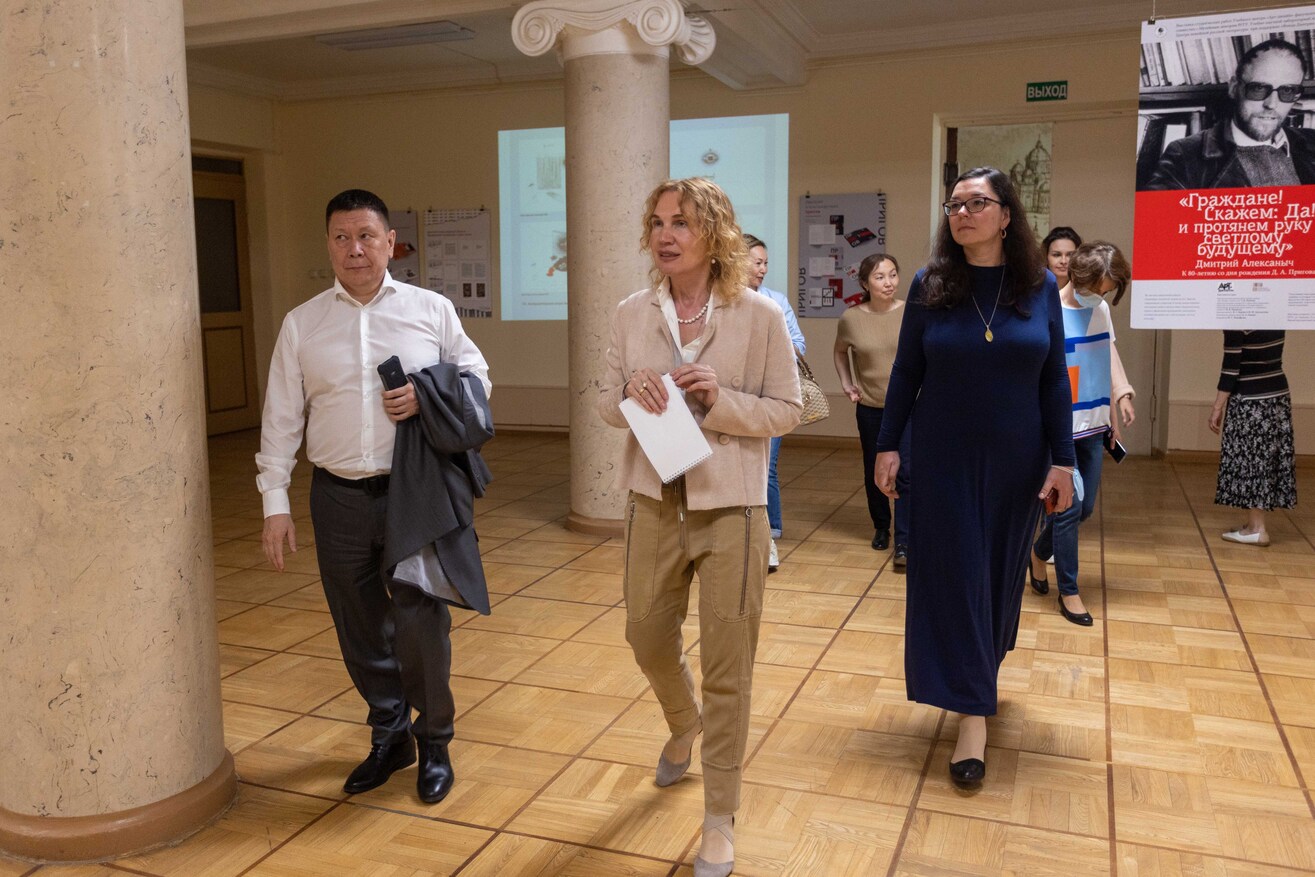
Dr. Veisalova, Vice-President of the Association of Indigenous Minorities of the North, Siberia and the Far East of the Russian Federation for education, native languages of the indigenous peoples of the North, Siberia and the Far East of the Russian Federation and project activities in the field of education, made a proposal to expand the advisory board: “I propose to expand the advisory board to include more academic representatives from among the indigenous minorities. In my opinion, it is necessary to include our experts in the project so that the work embraces the opinion of the peoples' representatives themselves.”
During the discussion, Mr. Gayulsky, Vice-President of the Association of Indigenous Peoples of the North, Siberia and the Far East of the Russian Federation for the Siberian Federal District, drew attention to the relationship of language and culture with the environment: “80% of language and culture are associated with the environment, which, in turn, is associated with the activities of indigenous minorities. These are reindeer husbandry, fishing and fur trade. Languages are tied to economic activity.”
Mr. Klimov, Vice-President of the Association of Indigenous Peoples of the North, Siberia and the Far East of the Russian Federation for Regional Cooperation, proposed to involve in the project the Association of Teachers of Indigenous Peoples of the North, Siberia and the Far East of the Russian Federation.
Concluding the meeting, Rector Bezborodov stressed that all the proposals will be given full consideration.
“The issues that we discussed today will be systematically considered and recorded. Dr. Afanasyev, Supervising Deputy Minister of Science and Higher Education of the Russian Federation, will be informed in detail about the results of the meeting. Thank you for your open work and new proposals that will improve some parts of the concept of the interactive atlas,” said Rector Bezborodov.
First Vice-Rector Pavlenko thanked the participants of the discussion for their interest in the work of the project, noting the importance of all the proposals voiced at the meeting.
“Thank you very much for the valuable ideas. We will draw up a protocol of our meeting and send it to you for approval, and then to the Ministry of Science and Higher Education of the Russian Federation. We are also waiting for specific suggestions from you on supplementing the encyclopedic section of the atlas. We are grateful for the trust that the Association has shown us in the work on such an important project,” concluded Olga Vyacheslavovna.
After the meeting, an excursion to the Museum Center of RSUH was held for the delegation of the Association of Indigenous Minorities of the North, Siberia and the Far East.